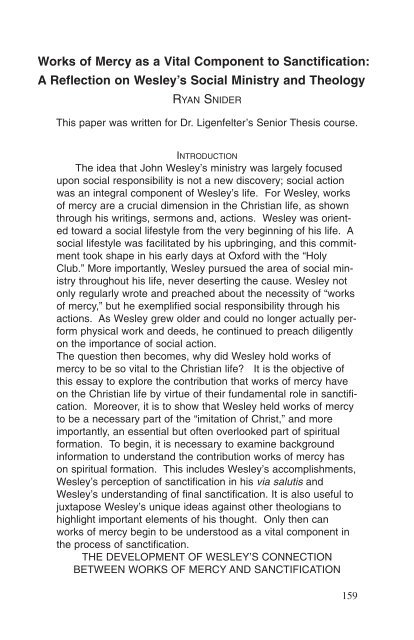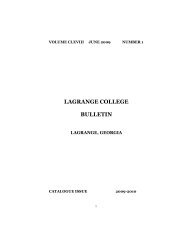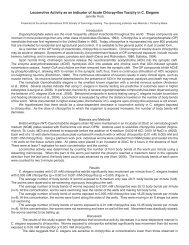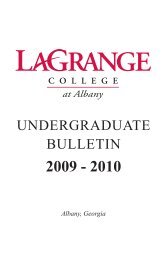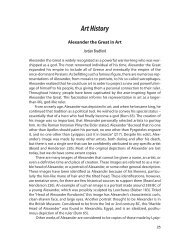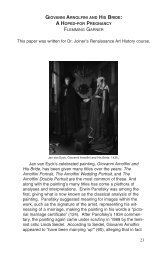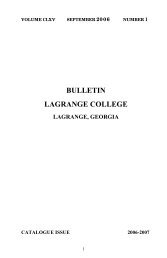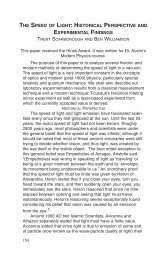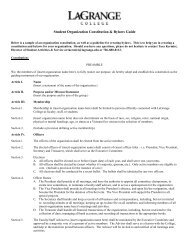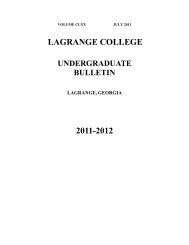Works of Mercy as a Vital Component to Sanctification - LaGrange ...
Works of Mercy as a Vital Component to Sanctification - LaGrange ...
Works of Mercy as a Vital Component to Sanctification - LaGrange ...
Create successful ePaper yourself
Turn your PDF publications into a flip-book with our unique Google optimized e-Paper software.
<strong>Works</strong> <strong>of</strong> <strong>Mercy</strong> <strong>as</strong> a <strong>Vital</strong> <strong>Component</strong> <strong>to</strong> <strong>Sanctification</strong>:<br />
A Reflection on Wesley’s Social Ministry and Theology<br />
RYAN SNIDER<br />
This paper w<strong>as</strong> written for Dr. Ligenfelter’s Senior Thesis course.<br />
INTRODUCTION<br />
The idea that John Wesley’s ministry w<strong>as</strong> largely focused<br />
upon social responsibility is not a new discovery; social action<br />
w<strong>as</strong> an integral component <strong>of</strong> Wesley’s life. For Wesley, works<br />
<strong>of</strong> mercy are a crucial dimension in the Christian life, <strong>as</strong> shown<br />
through his writings, sermons and, actions. Wesley w<strong>as</strong> oriented<br />
<strong>to</strong>ward a social lifestyle from the very beginning <strong>of</strong> his life. A<br />
social lifestyle w<strong>as</strong> facilitated by his upbringing, and this commitment<br />
<strong>to</strong>ok shape in his early days at Oxford with the “Holy<br />
Club.” More importantly, Wesley pursued the area <strong>of</strong> social ministry<br />
throughout his life, never deserting the cause. Wesley not<br />
only regularly wrote and preached about the necessity <strong>of</strong> “works<br />
<strong>of</strong> mercy,” but he exemplified social responsibility through his<br />
actions. As Wesley grew older and could no longer actually perform<br />
physical work and deeds, he continued <strong>to</strong> preach diligently<br />
on the importance <strong>of</strong> social action.<br />
The question then becomes, why did Wesley hold works <strong>of</strong><br />
mercy <strong>to</strong> be so vital <strong>to</strong> the Christian life? It is the objective <strong>of</strong><br />
this essay <strong>to</strong> explore the contribution that works <strong>of</strong> mercy have<br />
on the Christian life by virtue <strong>of</strong> their fundamental role in sanctification.<br />
Moreover, it is <strong>to</strong> show that Wesley held works <strong>of</strong> mercy<br />
<strong>to</strong> be a necessary part <strong>of</strong> the “imitation <strong>of</strong> Christ,” and more<br />
importantly, an essential but <strong>of</strong>ten overlooked part <strong>of</strong> spiritual<br />
formation. To begin, it is necessary <strong>to</strong> examine background<br />
information <strong>to</strong> understand the contribution works <strong>of</strong> mercy h<strong>as</strong><br />
on spiritual formation. This includes Wesley’s accomplishments,<br />
Wesley’s perception <strong>of</strong> sanctification in his via salutis and<br />
Wesley’s understanding <strong>of</strong> final sanctification. It is also useful <strong>to</strong><br />
juxtapose Wesley’s unique ide<strong>as</strong> against other theologians <strong>to</strong><br />
highlight important elements <strong>of</strong> his thought. Only then can<br />
works <strong>of</strong> mercy begin <strong>to</strong> be unders<strong>to</strong>od <strong>as</strong> a vital component in<br />
the process <strong>of</strong> sanctification.<br />
THE DEVELOPMENT OF WESLEY’S CONNECTION<br />
BETWEEN WORKS OF MERCY AND SANCTIFICATION<br />
159
<strong>Works</strong> <strong>of</strong> <strong>Mercy</strong> <strong>as</strong> a <strong>Vital</strong> <strong>Component</strong> <strong>to</strong> <strong>Sanctification</strong><br />
Wesley’s Devotion <strong>to</strong> <strong>Works</strong> <strong>of</strong> <strong>Mercy</strong><br />
Initially, it is beneficial <strong>to</strong> present the many different<br />
are<strong>as</strong> <strong>of</strong> “works <strong>of</strong> mercy” that John Wesley held <strong>to</strong> be important.<br />
Wesleyan scholar Richard Heitzenrater summarizes some<br />
<strong>of</strong> Wesley’s important deeds <strong>as</strong> being, “teaching, feeding, and<br />
clothing poor children; furnishing gainful employment <strong>to</strong> the jobless;<br />
giving loans <strong>to</strong> struggling entrepreneurs; visiting the sick<br />
and the prisoners; providing food, money, clothing shelter,<br />
books, medicine, and other essentials <strong>to</strong> the needy.” 1<br />
Heitzenrater maintains that the deeds Wesley performed were<br />
uncharacteristic for an individual <strong>of</strong> such distinction and background.<br />
Wesley’s interest in social works w<strong>as</strong> not normal for an<br />
Oxford don who w<strong>as</strong> educated at one <strong>of</strong> the best Oxford colleges<br />
and w<strong>as</strong> from a background <strong>of</strong> scholarly parents. 2<br />
Wesley w<strong>as</strong> involved in numerous works <strong>of</strong> mercy<br />
throughout his lifetime and therefore each area cannot be examined<br />
in detail. However, in order <strong>to</strong> show Wesley’s lifelong devotion<br />
<strong>to</strong> works <strong>of</strong> mercy, it is beneficial <strong>to</strong> discuss three specific<br />
are<strong>as</strong> <strong>to</strong>ward which Wesley continually devoted programs.<br />
These are<strong>as</strong> were <strong>as</strong>sisting the poor, <strong>as</strong>sisting the sick, and providing<br />
education for children and adults. An understanding <strong>of</strong><br />
these three are<strong>as</strong> will be beneficial later <strong>to</strong> understand the transformative<br />
impact <strong>of</strong> works <strong>of</strong> mercy.<br />
First, one <strong>of</strong> Wesley’s chief concerns w<strong>as</strong> the issue <strong>of</strong><br />
money in the <strong>as</strong>sistance <strong>of</strong> the poor. Wesley’s concern for<br />
money never left him, partly because the widespread poverty<br />
throughout England. One <strong>of</strong> the ways in which Wesley attempted<br />
<strong>to</strong> make a difference <strong>to</strong> the poor is by addressing the dangers<br />
<strong>of</strong> money. His beliefs in the dangers <strong>of</strong> the misuse <strong>of</strong><br />
money is apparent throughout his life, beginning especially with<br />
his 1748-1750 sermons on “The Sermon on the Mount” and<br />
continuing through sermons he wrote in his elder years, such <strong>as</strong><br />
“ The Danger <strong>of</strong> Riches” (1781), “On Riches” (1788), and “The<br />
Danger <strong>of</strong> Incre<strong>as</strong>ing Riches” (1790). Additionally, Wesley is<br />
noted for his 1760 sermon, “The Use <strong>of</strong> Money” in which he promotes<br />
the three rules, “Gain all you can,” “Save all you can,”<br />
and “Give all you can.” 3 Wesley epi<strong>to</strong>mized these three rules,<br />
especially the latter, by developing programs <strong>to</strong> give food,<br />
clothes, and housing <strong>to</strong> relieve the helpless. More importantly,<br />
Wesley impacted his society by boosting employment, thereby<br />
helping those in need <strong>to</strong> achieve self-sufficiency.<br />
160
Ryan Snider<br />
Secondly, Wesley’s social ministry w<strong>as</strong> strongly focused<br />
upon the sick. One <strong>of</strong> Wesley’s most important sermons, “On<br />
Visiting the Sick” (1786), illustrates the depth <strong>of</strong> his comp<strong>as</strong>sion.<br />
More than merely writing, Wesley established free medical clinics<br />
in London, Newc<strong>as</strong>tle, and Bris<strong>to</strong>l. Wesley’s Foundery clinic<br />
is sometimes called the first free public medical clinic in<br />
London. 4 Additionally, Wesley is known for instituting the group<br />
entitled, “visi<strong>to</strong>rs <strong>of</strong> the sick,” in 1741 <strong>to</strong> minister throughout<br />
places with Methodist presence. 5 Wesley w<strong>as</strong> also interested in<br />
the prevention <strong>of</strong> illness, in addition <strong>to</strong> the prevention <strong>of</strong> poverty;<br />
consequently, he frequently read and studied about dise<strong>as</strong>e prevention.<br />
6 A primary example <strong>of</strong> this interest is in his 1747 publication<br />
Primitive Physick; or an E<strong>as</strong>y and Natural Method <strong>of</strong><br />
Curing Most Dise<strong>as</strong>es.<br />
A l<strong>as</strong>t category <strong>of</strong> programs that Wesley activated is<br />
educational programs. Wesley held education <strong>to</strong> be pertinent not<br />
only <strong>to</strong> train children, but also <strong>to</strong> liberate uneducated adults. For<br />
this re<strong>as</strong>on, Wesley founded schools in many places including<br />
the Foundery, Bris<strong>to</strong>l, and Newc<strong>as</strong>tle, but he is most famous for<br />
the beginning the ever demanding Kingswood School <strong>of</strong> 1748.<br />
Wesley also established a publishing system on behalf <strong>of</strong> the<br />
adults <strong>to</strong> provide cheap books or pamphlets <strong>to</strong> educate the poor<br />
on the knowledge <strong>of</strong> the world and the Christian faith.<br />
Wesley’s Via Salutis<br />
To begin the examination <strong>of</strong> sanctification, it is important<br />
<strong>to</strong> understand the role that sanctification plays in Wesley’s via<br />
salutis. The most concise and important document for this purpose<br />
is Wesley’s 1765 sermon entitled, “The Scripture Way <strong>of</strong><br />
Salvation.” This document shows that Wesley w<strong>as</strong> convinced<br />
that salvation is a process consisting <strong>of</strong> stages in which God’s<br />
grace is distributed <strong>to</strong> an individual, grace upon grace.<br />
To understand Wesley’s via salutis, a few central doctrines<br />
and themes from Wesley’s sermon need <strong>to</strong> be examined<br />
in a summarized f<strong>as</strong>hion. A first concept Wesley introduces is<br />
prevenient grace, or “grace that comes before.” This grace is<br />
initiated by divine action <strong>to</strong> show humankind its sinful condition<br />
and the availability <strong>of</strong> something more. It is also representative<br />
<strong>of</strong> Wesley’s belief <strong>of</strong> God <strong>as</strong> the pursuer. 7 Wesley further states<br />
that everyone receives this grace, and if one chooses <strong>to</strong> accept<br />
it, the grace brings one <strong>to</strong> “do justly, <strong>to</strong> love mercy, and <strong>to</strong> walk<br />
161
<strong>Works</strong> <strong>of</strong> <strong>Mercy</strong> <strong>as</strong> a <strong>Vital</strong> <strong>Component</strong> <strong>to</strong> <strong>Sanctification</strong><br />
humbly with his God,” bringing one <strong>to</strong> repentance. 8 Following<br />
the act <strong>of</strong> repentance, one is prepared for justification and forgiveness<br />
by means <strong>of</strong> justifying grace, and sins are pardoned.<br />
One then begins the process <strong>of</strong> being res<strong>to</strong>red <strong>to</strong> the image <strong>of</strong><br />
God. 9 Furthermore, following the suit <strong>of</strong> the Protestant reformers,<br />
Wesley states that the only condition necessary for justification<br />
is faith. Wesley also importantly declares that at justification<br />
there is a “real <strong>as</strong> well <strong>as</strong> relative change” <strong>as</strong> regeneration, or<br />
new birth, begins. 10 The process <strong>of</strong> sanctification begins<br />
through new birth and a real change occurs in the individual.<br />
Here the individual actually begins the process <strong>of</strong> becoming<br />
holy, seeking perfection <strong>of</strong> love, or Christian perfection, <strong>as</strong> the<br />
ultimate goal and purpose <strong>of</strong> religion. 11 <strong>Sanctification</strong> should<br />
now be unders<strong>to</strong>od <strong>as</strong> the process <strong>of</strong> becoming holy.<br />
More specific information concerning Wesley’s via<br />
salutis is needed in two are<strong>as</strong> <strong>to</strong> further explore the effect works<br />
<strong>of</strong> mercy plays on sanctification. It h<strong>as</strong> been stated that Wesley<br />
believed sanctification <strong>to</strong> be a process that is separated from<br />
justification, but the significance <strong>of</strong> such a distinction h<strong>as</strong> not<br />
been maintained. Therefore, a better description <strong>of</strong> the distinction<br />
between justification and sanctification is needed. Second,<br />
there w<strong>as</strong>, and still is, a varying idea <strong>of</strong> what Christian perfection<br />
means. Consequently, there needs <strong>to</strong> be a more adequate<br />
explanation <strong>of</strong> what Christian perfection meant <strong>to</strong> Wesley. It is<br />
helpful <strong>to</strong> study these two <strong>as</strong>pects <strong>of</strong> Wesley’s theology against<br />
other theologians, because some <strong>of</strong> Wesley’s esteemed ide<strong>as</strong><br />
are made more intelligible. Moreover, Wesley’s separation <strong>of</strong><br />
sanctification from justification and his understanding <strong>of</strong><br />
Christian perfection initiate an understanding <strong>of</strong> the transforming<br />
power in works <strong>of</strong> mercy.<br />
Wesley’s Via Salutis Compared against the Reformers<br />
Wesley’s via salutis can be demonstrated <strong>as</strong> opportunistic<br />
for works <strong>of</strong> mercy when it is juxtaposed against the ide<strong>as</strong> <strong>of</strong><br />
the reformers Martin Luther and John Calvin. First, Wesley<br />
understands sanctification <strong>to</strong> be a process partly resulting from<br />
his distinction between justification and sanctification.<br />
<strong>Sanctification</strong> can be illuminated <strong>as</strong> a process when it is compared<br />
against Luther’s focus on justification. It is also important<br />
<strong>to</strong> examine the influence that the Lutheran-oriented Moravians<br />
had upon Wesley. Secondly, one can e<strong>as</strong>ily perceive the<br />
emph<strong>as</strong>is <strong>of</strong> love in Wesleyan theology when Wesley is com-<br />
162
Ryan Snider<br />
pared <strong>to</strong> Calvin. Wesley’s emph<strong>as</strong>is on holy living underlies the<br />
theological difference in the way that the two theologians define<br />
justification and sanctification. Furthermore, sanctification will<br />
be unders<strong>to</strong>od <strong>as</strong> a process wherein works <strong>of</strong> mercy can make<br />
a difference once this comparison is made.<br />
Wesley’s teleological outlook on sanctification is very different<br />
from that <strong>of</strong> Martin Luther, who insists that the change <strong>of</strong> the<br />
status <strong>of</strong> the person is the goal <strong>of</strong> salvation. 12 Wesley also differs<br />
from Luther by restricting justification <strong>to</strong> be the forgiveness<br />
<strong>of</strong> sin. Luther, on the other hand, connects grace with righteousness<br />
at justification. This connection between grace and righteousness<br />
principally results from his idea that grace is the “favor<br />
<strong>of</strong> God—not a quality <strong>of</strong> the soul” and a “living, active and operative<br />
spirit.” 13 Furthermore, Luther redefined righteousness<br />
from the active and formal state <strong>to</strong> that “p<strong>as</strong>sive righteousness<br />
in which the merciful God justifies us by faith.” 14 Faith is a gift<br />
<strong>of</strong> God since righteousness is entirely in the mercy <strong>of</strong> God and<br />
not in human efforts. 15 In relation <strong>to</strong> a doctrine <strong>of</strong> sanctification,<br />
the Christian life is one <strong>of</strong> repentance, <strong>as</strong> “discovering and<br />
appropriating the grace and forgiveness <strong>of</strong> God is the supreme<br />
goal, and justification is the greatest gift.” 16 As Gerhard Ford, a<br />
contemporary Lutheran theologian says, sanctification is “the art<br />
<strong>of</strong> getting used <strong>to</strong> justification.” 17<br />
Wesley primarily came in<strong>to</strong> contact with Lutheran theology<br />
<strong>as</strong> a result <strong>of</strong> the Moravian influence during his mission <strong>to</strong><br />
Georgia in 1738. Wesley w<strong>as</strong> initially influenced heavily by the<br />
Moravians, and consequently continued <strong>to</strong> seek out the<br />
Moravians when he returned <strong>to</strong> England. A first b<strong>as</strong>ic influence<br />
the Moravians had on Wesley w<strong>as</strong> the adoption <strong>of</strong> cl<strong>as</strong>ses and<br />
societies through the influence <strong>of</strong> Peter Böhler, Count<br />
Zinzendorf, and the Herrnhut congregation. 18 The implementation<br />
<strong>of</strong> the cl<strong>as</strong>ses and societies become an important device for<br />
Wesley’s focus on transformation and his connection between<br />
piety and mercy. Even though Wesley separated sanctification<br />
from justification, the Moravians were most successful in orienting<br />
Wesley <strong>to</strong>ward the Lutheran centrality <strong>of</strong> justification by faith<br />
alone. Furthermore, the Moravians are famously noted for the<br />
influence they had on Wesley at a meeting at Aldersgate Street,<br />
when Wesley gained <strong>as</strong>surance <strong>of</strong> his own forgiveness and salvation.<br />
Moreover, Wesley learned from Lutheran theology and<br />
163
<strong>Works</strong> <strong>of</strong> <strong>Mercy</strong> <strong>as</strong> a <strong>Vital</strong> <strong>Component</strong> <strong>to</strong> <strong>Sanctification</strong><br />
the Aldersgate experience the importance <strong>of</strong> Christ’s grace <strong>to</strong><br />
transform and establish a new relationship. 19 Wesley learned<br />
that, “grace alone provides and remains the sure foundation for<br />
the relation <strong>to</strong> God. Grace is the substructure on which everything<br />
else is built.” 20<br />
Although Wesley w<strong>as</strong> originally excited by the strong<br />
emph<strong>as</strong>is on faith that the Moravian brethren had, it did not take<br />
him long <strong>to</strong> become weary <strong>of</strong> their doctrines. The Moravians did<br />
not share Wesley’s understanding <strong>of</strong> grace and also followed<br />
Luther by rejecting sanctification <strong>as</strong> a process. Thus, the<br />
Moravians and Wesley disagreed on the end and way <strong>to</strong> salvation.<br />
21 The disagreement between the two modes <strong>of</strong> thought is<br />
most evident in Wesley’s encounter with Philip Henry Molther<br />
and the “stillness” controversy. Molther’s b<strong>as</strong>ic argument states<br />
that one should wait upon the Lord and refrain from any works<br />
<strong>of</strong> piety or works <strong>of</strong> mercy, until persons have true faith in<br />
Christ. 22 Remaining still before the Lord ran contrary <strong>to</strong> many<br />
<strong>of</strong> Wesley’s beliefs and seriously challenged his understanding<br />
<strong>of</strong> Christian living.<br />
John Calvin’s theology <strong>of</strong> sanctification, on the other hand,<br />
is closer <strong>to</strong> Wesley’s primarily because both include the effort <strong>to</strong><br />
be res<strong>to</strong>red <strong>to</strong> the image <strong>of</strong> God. 23 Furthermore, the two traditions<br />
both describe sanctification <strong>as</strong> a process <strong>of</strong> growth in<br />
grace and a conquest <strong>of</strong> sin and evil; they also believe that<br />
there is no sanctification apart from justification and vice<br />
versa. 24 Although similar, the two traditions do diverge on their<br />
overall outlook on the sanctification/final perfection process, and<br />
in the vocabulary used. First, differences occur about when final<br />
perfection takes place. Calvin taught that sanctification is <strong>to</strong> be<br />
striven for but not expected in this life, therefore equating holiness<br />
only <strong>to</strong> a growth in faith. On the other hand, Wesley<br />
encouraged sanctification <strong>to</strong> be striven for and attained in this<br />
lifetime. 25 A b<strong>as</strong>ic difference between the two is in the vocabulary—Calvinists<br />
commonly refer <strong>to</strong> the process <strong>of</strong> Christian<br />
growth <strong>as</strong> conflict and temptation, while Methodists speak <strong>of</strong><br />
development and a governing by love. 26 At times, it seems that<br />
the two make up a battle <strong>of</strong> optimism versus pessimism.<br />
Howard Marshal, a younger scholar at Didsbury College in<br />
Bris<strong>to</strong>l, simplifies this idea by claiming that Calvin preached a<br />
164
Ryan Snider<br />
perfection <strong>of</strong> faith while Wesley preached a perfection <strong>of</strong> love. 27<br />
For Wesley, faith is a means <strong>of</strong> sanctification and love is the<br />
end.<br />
In sum, the differences between Wesley and the reformers<br />
point <strong>to</strong> a few crucial concepts that help understand the<br />
process <strong>of</strong> sanctification. One can now more clearly see why<br />
John Wesley diverged from Luther by distinguishing sanctification<br />
and justification and by making sanctification a process governed<br />
by grace. Luther’s concept <strong>of</strong> justification and sanctification<br />
does not have adequate room for works <strong>of</strong> mercy. This is<br />
important because Wesley’s process understanding <strong>of</strong> sanctification<br />
allows room for works <strong>of</strong> mercy. Also, the deviation from<br />
Calvin shows the emph<strong>as</strong>is that Wesley put on love <strong>as</strong> being a<br />
fundamental premise in perfection. The concentration Wesley<br />
had on love is vital <strong>to</strong> an understanding <strong>of</strong> works <strong>of</strong> mercy<br />
because love is an important underlying element in social<br />
action. Furthermore, Wesley’s emph<strong>as</strong>is on love becomes<br />
important when the experiential element <strong>of</strong> works <strong>of</strong> mercy is<br />
evaluated. In sum, Wesley embodies an idea <strong>of</strong> sanctification<br />
that not only h<strong>as</strong> room for works <strong>of</strong> mercy, but one in which<br />
works <strong>of</strong> mercy can also can play an integral role.<br />
Perfection <strong>of</strong> Love<br />
Second, Wesley’s understanding <strong>of</strong> Christian perfection<br />
needs <strong>to</strong> be clarified <strong>to</strong> demonstrate Wesley’s concentration on<br />
love. Initially, it is important <strong>to</strong> recognize that Wesley did not produce<br />
his doctrine <strong>of</strong> perfection ex nihilo, but w<strong>as</strong> constantly<br />
learning from the various influences <strong>of</strong> his age. One strong<br />
influence with regard <strong>to</strong> Wesley’s idea <strong>of</strong> perfection is the<br />
Anglican Church. Wesley proclaimed himself always <strong>as</strong> a high<br />
churchman and therefore a successor <strong>to</strong> primitive Christianity.<br />
Furthermore, in an examination <strong>of</strong> Wesley’s ide<strong>as</strong> <strong>of</strong> sanctification<br />
and Christian perfection <strong>as</strong> compared <strong>to</strong> the Anglicans, one<br />
will find striking similarities. One important ideal that Wesley<br />
retained from Anglican theology is the focus upon transformation,<br />
and being “partakers <strong>of</strong> the divine nature.” 28 Bishop<br />
Beveridge, an Anglican theologian, states, “…Neither did He<br />
only merit by His life that I should be accounted righteous in Him<br />
before God, but likewise that I should be made righteous in<br />
myself by God.” 29<br />
Moreover, there is a strong relationship with Anglicanism<br />
on the doctrines <strong>of</strong> love and sanctification. Jeremy Taylor<br />
165
<strong>Works</strong> <strong>of</strong> <strong>Mercy</strong> <strong>as</strong> a <strong>Vital</strong> <strong>Component</strong> <strong>to</strong> <strong>Sanctification</strong><br />
states, “ perfection cannot be less than an entire piety, a holiness<br />
perfect in its parts, wanting nothing material, allowing no<br />
vicious habit, permitting no vile action, but contending <strong>to</strong>ward<br />
the great excellency, a charitable heart <strong>to</strong> be pure and ple<strong>as</strong>ing<br />
<strong>to</strong> God in Jesus Christ…” 30 Additionally, the Anglican tradition<br />
w<strong>as</strong> clear <strong>to</strong> announce that perfection is not an achieved end,<br />
but a dynamic process. Bishop Andrews states, “the farther<br />
onward their journey, the nearer their journey’s end, the more<br />
perfect; which is the perfection <strong>of</strong> this life, for this life is a journey.”<br />
31 Moreover, Wesley retains an Anglican notion <strong>of</strong> love <strong>as</strong><br />
being “the predominant fruit <strong>of</strong> holiness” in which “….having<br />
one’s soul fully inclined <strong>to</strong> God” cannot help but <strong>to</strong> love one’s<br />
neighbor <strong>as</strong> himself. 32<br />
Wesley’s understanding <strong>of</strong> Christian perfection is commonly<br />
misunders<strong>to</strong>od <strong>to</strong>day because the meaning <strong>of</strong> perfection<br />
is not in the Western sense meaning “perfected perfection (an<br />
achieved state <strong>of</strong> perfection).” Albert Outler maintains that<br />
Wesley, like the Anglicans, refers <strong>to</strong> perfection in the E<strong>as</strong>tern<br />
context meaning “perfecting perfection.” 33 This means that<br />
perfection is a continuous state in which love overcomes sin and<br />
the love <strong>of</strong> God and neighbor reigns. 34 In Wesley’s, “A Plain<br />
Account <strong>of</strong> Christian Perfection,” he notes that by perfection he<br />
means “…loving God with all our heart, mind, soul and strength.<br />
This implies that no wrong temper, none contrary <strong>to</strong> love in the<br />
soul; and that all the thoughts, words and actions are governed<br />
by pure love.” 35 Wesley began <strong>to</strong> make it clear that he did not<br />
want <strong>to</strong> use the term sinless perfection, which is also present in<br />
his defense, “Thoughts on Christian Perfection.”<br />
Although Wesley did not desire <strong>to</strong> bring sinless perfection<br />
in<strong>to</strong> play, Wesley is at times criticized for having a substantialist<br />
understanding <strong>of</strong> sin—meaning that perfection is the removal <strong>of</strong><br />
the substance <strong>of</strong> sin which originated in the Fall. It is first important<br />
<strong>to</strong> note that Wesley retained the idea that in the regenerate<br />
being original sin remains a source <strong>of</strong> temptation. It is later that<br />
God will give a divine grace <strong>to</strong> achieve the promise <strong>of</strong> being free<br />
from all sin when “it shall ple<strong>as</strong>e our Lord <strong>to</strong> ‘speak <strong>to</strong> our hearts<br />
again,’ <strong>to</strong> speak a second time, ‘Be Clean.’ And then only ‘the<br />
leprosy is cleansed.’ Then only the evil root, the carnal mind, is<br />
destroyed, and inbred sin subsists no more.” 36 Furthermore,<br />
when Wesley w<strong>as</strong> <strong>as</strong>ked whether perfection is instantaneous or<br />
166
Ryan Snider<br />
gradual, problems came his way. In answer <strong>to</strong> the question,<br />
Wesley maintains that it is both gradual and instantaneous; it is<br />
gradual in the sense that one is growing in grace from the<br />
moment one is justified, while also instantaneous, <strong>as</strong> there must<br />
be a moment before death in which sin no longer exists. 37 A<br />
possible inconsistency arises here, <strong>as</strong> Wesley is in danger <strong>of</strong><br />
confirming what he w<strong>as</strong> condemning, that is, predestination. If<br />
sin is a substance that is removed by an act <strong>of</strong> divine grace, it<br />
follows that some are chosen and some are not. 38 Although<br />
there is an inconsistency with Wesley’s thought in this area, it<br />
only arises when Wesley’s message is unders<strong>to</strong>od out <strong>of</strong> context.<br />
Wesley never intended <strong>to</strong> deal with sinless perfection, but<br />
with perfection <strong>of</strong> love.<br />
In conclusion, the heart <strong>of</strong> Wesley’s message is what is<br />
important. Wesley’s message does not focus on sinless perfection<br />
but on what he actually preached and practiced, which is<br />
love. Moreover, the teleological element is also important—the<br />
idea that love plays a role in defeating sin in the present life and<br />
in “being res<strong>to</strong>red <strong>to</strong> the image <strong>of</strong> God.” 39 An endorsement <strong>of</strong><br />
perfection <strong>of</strong> faith rather than love forces one <strong>to</strong> be less socially<br />
minded. A Wesleyan emph<strong>as</strong>is on perfection <strong>of</strong> love allows<br />
works <strong>of</strong> mercy <strong>to</strong> play a defining role in sanctification. This<br />
focus on love becomes <strong>of</strong> paramount importance through<br />
Wesley’s focus on love <strong>of</strong> God and neighbor <strong>as</strong> the primary rule<br />
<strong>of</strong> living. It is in this sense that one can begin <strong>to</strong> understand<br />
how love produces the good works that will play a crucial part in<br />
defeating sin and in becoming res<strong>to</strong>red <strong>to</strong> the image in which we<br />
were made.<br />
ATTAINING HOLINESS THROUGH WORKS OF MERCY<br />
Holiness by Imitating Christ<br />
Once Wesley’s via salutis is gr<strong>as</strong>ped, one can begin <strong>to</strong><br />
understand the rationale behind Wesley’s social ministry.<br />
Foremost, drawing from an Anglican influence, Wesley held high<br />
regard for the life that Christ lived and for the importance <strong>of</strong><br />
striving after a similar lifestyle <strong>as</strong> a re<strong>as</strong>on for social responsibility.<br />
For instance, Jeremy Taylor insisted that Christian perfection<br />
requires “Christlikeness in human soul and character…<strong>to</strong> be<br />
holy like him or in imitation <strong>of</strong> him.” 40 Wesley similarly perceives<br />
holiness <strong>as</strong> resulting from the endeavor <strong>to</strong> live <strong>as</strong> Christ<br />
did. Furthermore, the venture <strong>to</strong> imitate Christ led Wesley <strong>to</strong><br />
deduce several other important values. These are the ideals <strong>of</strong><br />
167
<strong>Works</strong> <strong>of</strong> <strong>Mercy</strong> <strong>as</strong> a <strong>Vital</strong> <strong>Component</strong> <strong>to</strong> <strong>Sanctification</strong><br />
poverty, a view <strong>of</strong> salvation <strong>as</strong> holistic, and the importance <strong>of</strong> the<br />
apos<strong>to</strong>lic church. The imitation <strong>of</strong> Christ and the ideals deduced<br />
from it point <strong>to</strong> a social lifestyle and thus begin <strong>to</strong> show rationale<br />
for works <strong>of</strong> mercy in sanctification. With that said, these ideals<br />
do not make the connection between works <strong>of</strong> mercy and sanctification<br />
fully intelligible, but show that the imitation <strong>of</strong> Christ is<br />
groundwork for works <strong>of</strong> mercy.<br />
The first and most important ideal for Wesley in relation<br />
<strong>to</strong> works <strong>of</strong> mercy is the endeavor <strong>to</strong> live out the example that<br />
Christ set forth. To begin, it can be argued that Wesley participated<br />
in works <strong>of</strong> mercy so fervently because Jesus commanded<br />
him <strong>to</strong> do so. In addition, because a renewal <strong>to</strong> the image <strong>of</strong><br />
God is the goal <strong>of</strong> sanctification, and God’s nature is revealed in<br />
Jesus, an imitation <strong>of</strong> Christ plays an important role in becoming<br />
holy. 41 More plainly, a b<strong>as</strong>is <strong>of</strong> the connection between works <strong>of</strong><br />
mercy and sanctification is located in imitating Jesus, the example<br />
<strong>of</strong> God’s nature. The imitation <strong>of</strong> Christ creates a few important<br />
values for Wesley. First, a key example that Christ set forth<br />
is the poverty and self-denial he demonstrated. For Wesley,<br />
Christ’s poverty is not <strong>to</strong> be lived out in the medieval sense <strong>of</strong><br />
absolute poverty, because Wesley himself embraced wealth in<br />
order <strong>to</strong> give money away. Rather, the poverty that Christ<br />
embraced becomes more important in terms <strong>of</strong> self- denial. 42<br />
In Sermon 48, “Self-Denial”, Wesley proclaims the importance <strong>of</strong><br />
self-denial partly because Christ embodied it. Wesley maintains,<br />
“It is absolutely necessary, in the very nature <strong>of</strong> the thing, <strong>to</strong> our<br />
coming after Him and following Him; insomuch that, <strong>as</strong> far <strong>as</strong> we<br />
do not practice it, we are not his disciples. If we do not continually<br />
deny ourselves, we do not learn <strong>of</strong> Him, but <strong>of</strong> other m<strong>as</strong>ters.”<br />
43<br />
It is also essential <strong>to</strong> note that Wesley w<strong>as</strong> influenced by<br />
Christ’s attitude <strong>to</strong>ward the poor. In the sermon “On Ple<strong>as</strong>ing All<br />
Men,” Wesley explains that we are <strong>to</strong> honor the poor for our<br />
Crea<strong>to</strong>r’s sake and <strong>to</strong> love them for the sake <strong>of</strong> our Redeemer.<br />
In Wesley’s eyes, we are <strong>to</strong> love the poor because Christ loved<br />
them. 44 Wesley followed Christ’s example and made the poor<br />
an integral part <strong>of</strong> his ministry <strong>to</strong> whom he could show affection<br />
and with whom he could enter in<strong>to</strong> solidarity. 45 Further evidence<br />
for this idea can be seen in Christ’s “Sermon on the Mount,”<br />
which w<strong>as</strong> an essential doctrine <strong>to</strong> Wesley. The importance <strong>of</strong><br />
168
Ryan Snider<br />
the “Sermon on the Mount” is evident; he preached on it at le<strong>as</strong>t<br />
one hundred times by the time his numerous sermons on it were<br />
published. 46 Moreover, Wesley believed that the works <strong>of</strong><br />
mercy in the sermon such <strong>as</strong> anti-wealth, anti-mammon, charity,<br />
peacemaking, and the idea <strong>of</strong> social religion <strong>to</strong> be part <strong>of</strong> the<br />
orthopraxis that were essential <strong>to</strong> salvation. 47<br />
Wesley also embodied Christ’s attitude <strong>to</strong>ward the sick,<br />
leading him <strong>to</strong> view salvation <strong>as</strong> holistic. Before one can understand<br />
the relationship between Christ’s attention <strong>to</strong> the poor and<br />
Wesley’s attention <strong>to</strong> the poor, it is important <strong>to</strong> understand the<br />
theology behind Wesley’s understanding <strong>of</strong> holism. This belief<br />
originates with the idea that one is sick from sin, and during<br />
sanctification one is therapeutically becoming delivered from the<br />
plague <strong>of</strong> sin. 48 This inward plague extends <strong>to</strong> the physical<br />
body, making both the inward and outward body crucial <strong>to</strong> the<br />
spiritual state. Wesley held that God w<strong>as</strong> not only a physician <strong>of</strong><br />
the soul, but also <strong>to</strong> the <strong>to</strong>tal well being <strong>of</strong> an individual including<br />
the body. 49 It is clear that the mind and the body are both crucial<br />
elements <strong>to</strong> a good spiritual state. Moreover, Wesley<br />
thought that the mind and body were connected, meaning the<br />
mind can cause disorder <strong>to</strong> the body and the body can do the<br />
same <strong>to</strong> the mind. 50 It is obvious that <strong>to</strong> Wesley a poor physical<br />
condition may become detrimental <strong>to</strong> one’s spiritual standing;<br />
thus, works directed <strong>to</strong>ward one with a poor physical condition<br />
may have great impact on their spiritual state.<br />
Wesley’s holistic view <strong>of</strong> salvation is patterned after<br />
Christ’s ministry. Christ’s work with the physical needs <strong>of</strong> people<br />
becomes more than an <strong>of</strong>fering; it is an “integral part <strong>of</strong> his saving<br />
work.” 51 When works <strong>of</strong> mercy contribute <strong>to</strong> an individual<br />
with poor physical health, there may be an impact evangelically<br />
by showing Christ’s character and overcoming the lack <strong>of</strong><br />
authentic Christian witness. 52 In this sense Wesley’s theology<br />
is again practical <strong>as</strong> he shows rationale for works <strong>of</strong> mercy and<br />
evangelism.<br />
L<strong>as</strong>tly, Wesley held apos<strong>to</strong>lic poverty and communalism<br />
important because the apostles were trying <strong>to</strong> live like Christ.<br />
This ideal is most evident when dealing with Wesley’s rules for<br />
the “select society,” or those who claimed entire sanctification. 53<br />
The three rules Wesley fixed were: “maintain confidence about<br />
their discussions; submit <strong>to</strong> their minister <strong>as</strong> spiritual direc<strong>to</strong>r;<br />
169
<strong>Works</strong> <strong>of</strong> <strong>Mercy</strong> <strong>as</strong> a <strong>Vital</strong> <strong>Component</strong> <strong>to</strong> <strong>Sanctification</strong><br />
and bring all the money they could spare once a week ‘<strong>to</strong>ward a<br />
common s<strong>to</strong>ck.’ ” 54 Furthermore, in Wesley’s 1783 sermon,<br />
“The General Spread <strong>of</strong> the Gospel,” Wesley says that communally<br />
sharing goods is an escha<strong>to</strong>logical goal <strong>to</strong> be realized<br />
when Pentecost fully comes. Wesley says, “”None <strong>of</strong> them [the<br />
Church] will say, that aught <strong>of</strong> the things which he possesses is<br />
his own; but they will have all things common. Neither will there<br />
be any among them that want: For <strong>as</strong> many <strong>as</strong> are possessed<br />
<strong>of</strong> lands or houses will sell them; and distribution will be made <strong>to</strong><br />
every man, according <strong>as</strong> he h<strong>as</strong> need.” All their desires, meantime,<br />
and p<strong>as</strong>sions, and tempers will be c<strong>as</strong>t in one mould.” 55<br />
This Anglican commitment <strong>to</strong> the apos<strong>to</strong>lic church w<strong>as</strong> an ideal<br />
that Wesley held dearly and w<strong>as</strong> one he strove <strong>to</strong> revive through<br />
the Methodism revival movement. 56 Wesley w<strong>as</strong> promoting cultural<br />
change <strong>as</strong> well <strong>as</strong> works <strong>of</strong> mercy by trying <strong>to</strong> recover the<br />
imitation <strong>of</strong> Christ embodied by the early church.<br />
In sum, it is evident that for Wesley the imitation <strong>of</strong><br />
Christ imparts motivation <strong>to</strong> undertake works <strong>of</strong> mercy.<br />
Moreover, the imitation <strong>of</strong> Christ is an element that connects<br />
sanctification <strong>to</strong> works <strong>of</strong> mercy. Because God is revealed in<br />
Jesus, it follows that one can become sanctified (res<strong>to</strong>red <strong>to</strong> the<br />
image <strong>of</strong> God) through the imitation <strong>of</strong> Christ. Although this is<br />
true, there is more <strong>to</strong> the picture; an important element is missing.<br />
By understanding the imitation <strong>of</strong> Christ <strong>as</strong> the only incentive<br />
for works <strong>of</strong> mercy, one is likely <strong>to</strong> misunderstand works <strong>of</strong><br />
mercy <strong>as</strong> only a duty and not a response <strong>to</strong> God’s love and<br />
grace. If works <strong>of</strong> mercy are not grounded in an initial experience<br />
<strong>of</strong> God’s love, one is in danger <strong>of</strong> works-righteousness and<br />
human efforts <strong>to</strong> become holy. The missing element allows for a<br />
simpler illustration <strong>of</strong> God’s prevenience and the human<br />
response—one response being works <strong>of</strong> mercy. Moreover, if the<br />
imitation <strong>of</strong> Christ is the only rationale for works <strong>of</strong> mercy, one is<br />
in danger <strong>of</strong> limiting the means <strong>to</strong> holiness <strong>to</strong> one area.<br />
Expanding the Means <strong>to</strong> Holiness<br />
The missing element that completes the connection<br />
between works <strong>of</strong> mercy and sanctification lies in grace. Wesley<br />
views sanctification <strong>as</strong> a process governed by grace, because it<br />
is through God’s grace that one begins <strong>to</strong> defeat the presence <strong>of</strong><br />
sin and become perfect in love. As Randy Maddox states,<br />
“When one understands sanctification on Wesley’s terms, <strong>as</strong> a<br />
life-long process <strong>of</strong> healing our sin-dis<strong>to</strong>rted affections, there is<br />
170
Ryan Snider<br />
an obvious need for continually renewing the empowerment for<br />
this healing.” 57 This empowering dimension is referred <strong>to</strong> <strong>as</strong><br />
the “means <strong>of</strong> grace,” or the “outward signs, words, or actions,<br />
ordained <strong>of</strong> God, and appointed for this end, <strong>to</strong> be the ordinary<br />
channels whereby God might convey <strong>to</strong> men, preventing, justifying,<br />
or sanctifying grace.” 58 Here, grace through faith becomes<br />
the central means in sanctification. Wesley defended works <strong>of</strong><br />
mercy <strong>as</strong> a means <strong>of</strong> grace <strong>to</strong> allow for the change and transformation<br />
that takes place in the individual. Additionally, Wesley<br />
defended works <strong>of</strong> mercy <strong>as</strong> a means <strong>of</strong> grace <strong>to</strong> allow for an<br />
element that compels a response <strong>to</strong> God’s leading and convicting.<br />
This understanding <strong>of</strong> works <strong>of</strong> mercy is the connecting element<br />
that reaches beyond imitating Christ, provides rationale for<br />
a life filled with love, and bes<strong>to</strong>ws a continual reliance on God<br />
for sanctification.<br />
Wesley understands there <strong>to</strong> be three types <strong>of</strong> means <strong>of</strong><br />
graces. The first group is commonly termed the general means<br />
<strong>of</strong> grace. This group is typified by the outlook and b<strong>as</strong>ic characteristics<br />
<strong>of</strong> the Christian life such <strong>as</strong> keeping the commandments,<br />
universal obedience, taking up the cross daily, and selfdenial.<br />
A second category is the instituted means <strong>of</strong> grace.<br />
This category contains the universal means <strong>of</strong> grace appointed<br />
by God such <strong>as</strong> The Lord’s Supper, f<strong>as</strong>ting, Christian conference,<br />
prayer, and searching the Scripture. A l<strong>as</strong>t, less objective,<br />
category is the prudential means <strong>of</strong> grace that vary from time <strong>to</strong><br />
time and person <strong>to</strong> person. The prudential means include occ<strong>as</strong>ions<br />
and practices, such <strong>as</strong> Wesley’s cl<strong>as</strong>s/band meetings,<br />
rules <strong>of</strong> holy living, love fe<strong>as</strong>ts, visiting the sick, doing all the<br />
good one can, etc. L<strong>as</strong>tly, although not a group, Wesley makes<br />
a clear distinction between works <strong>of</strong> piety and works <strong>of</strong> mercy <strong>as</strong><br />
types <strong>of</strong> human activity. 59<br />
The Necessity <strong>of</strong> Piety and <strong>Mercy</strong><br />
It is important <strong>to</strong> understand that for Wesley the means<br />
<strong>of</strong> grace were more than just individual activities or “works <strong>of</strong><br />
piety.” This is true in the sense that Wesley thought works <strong>of</strong><br />
piety <strong>to</strong> be <strong>of</strong> no value unless connected with works <strong>of</strong> mercy. 60<br />
Wesley distinguishes works <strong>of</strong> mercy over works <strong>of</strong> piety in various<br />
documents. Maddox quotes Wesley’s Sermon 92, “On<br />
Zeal,” <strong>to</strong> show the comparison <strong>of</strong> these different <strong>as</strong>pects <strong>of</strong><br />
Christianity. Wesley states:<br />
“In a Christian believer love sits upon the<br />
171
<strong>Works</strong> <strong>of</strong> <strong>Mercy</strong> <strong>as</strong> a <strong>Vital</strong> <strong>Component</strong> <strong>to</strong> <strong>Sanctification</strong><br />
throne…namely, love <strong>of</strong> God and man….In a circle near<br />
the throne are all holy tempers: long-suffering, gentleness,<br />
meekness….In an exterior circle are all the works<br />
<strong>of</strong> mercy, whether <strong>to</strong> the souls or bodies <strong>of</strong> men. By<br />
these we exercise all holy tempers; by these we continually<br />
improve them, so that all these are real means <strong>of</strong><br />
grace, although this is not commonly adverted <strong>to</strong>. Next<br />
<strong>to</strong> these are that are usually termed works <strong>of</strong> piety:<br />
reading and hearing the word; public, family, private<br />
prayer, receiving the Lord’s Supper, f<strong>as</strong>ting or abstinence.”<br />
61<br />
In this p<strong>as</strong>sage, Wesley not only shows works <strong>of</strong> mercy <strong>to</strong> be a<br />
crucial dimension <strong>of</strong> the means <strong>of</strong> grace, but he also places<br />
them higher than works <strong>of</strong> piety. Wesley even states that when<br />
works <strong>of</strong> piety and works <strong>of</strong> mercy interfere, the latter are <strong>to</strong> be<br />
preferred. 62<br />
This relationship between works <strong>of</strong> piety and works <strong>of</strong><br />
mercy is one that is <strong>of</strong>ten viewed <strong>as</strong> disharmonious even <strong>to</strong>day.<br />
For Wesley, orthopraxis (right practice) and orthodoxy (right<br />
belief) have a necessary connection in which they rely on each<br />
other. Essentially, works <strong>of</strong> mercy and works <strong>of</strong> piety are congruent<br />
because they are characterized by love <strong>of</strong> God and love<br />
<strong>of</strong> neighbor. The major problem for most people, especially in<br />
<strong>to</strong>day’s society, is that they have forgotten or do not know that<br />
works <strong>of</strong> mercy is a means <strong>of</strong> grace. This one-sided concern<br />
w<strong>as</strong> also on the mind <strong>of</strong> Wesley <strong>as</strong> he w<strong>as</strong> concerned that people<br />
would fall from grace due <strong>to</strong> a preoccupation with inner holiness,<br />
and not the manifestation <strong>of</strong> inner holiness in outward<br />
actions. 63 Furthermore, Wesley w<strong>as</strong> worried that the transformative<br />
element that works <strong>of</strong> mercy includes would be lost if<br />
only works <strong>of</strong> piety were practiced.<br />
Rieger makes it clear that Wesley thought works <strong>of</strong> piety<br />
<strong>to</strong> be dis<strong>to</strong>rted without works <strong>of</strong> mercy by saying, “The singular<br />
concern for the move from God <strong>to</strong> humanity might lead <strong>to</strong> an<br />
implicit scheme in which God’s grace becomes self-serving <strong>to</strong><br />
the person. What if the faithful are not interested in anything but<br />
themselves and their own salvation?” 64 By only understanding<br />
works <strong>of</strong> piety <strong>as</strong> a means <strong>of</strong> grace, an individual is missing out<br />
on the social <strong>as</strong>pect <strong>of</strong> Christianity. Reciprocally, self-centeredness<br />
is also a potential danger in orthopraxis without orthodoxy.<br />
<strong>Works</strong> become products <strong>of</strong> human effort and not an outward<br />
172
Ryan Snider<br />
expression <strong>of</strong> an inward experience <strong>of</strong> love. 65<br />
The two clearly are not sufficient alone; they must work<br />
<strong>to</strong>gether <strong>to</strong>ward achieving sanctification. In this sense, works <strong>of</strong><br />
mercy should not simply be valued over works <strong>of</strong> piety, but<br />
rather should be viewed <strong>as</strong> beneficial when combined with<br />
works <strong>of</strong> piety. The two are both means <strong>of</strong> grace that rely on<br />
each other <strong>to</strong> achieve the goal <strong>of</strong> sanctification. Henry H. Knight<br />
defines the differences between the two by describing works <strong>of</strong><br />
mercy <strong>as</strong> means <strong>of</strong> grace that “encourage openness <strong>to</strong> the presence<br />
<strong>of</strong> God” while the means <strong>of</strong> grace “describe the character<br />
and activity <strong>of</strong> God.” 66 Knight’s characterization already suggests<br />
the necessity <strong>to</strong> combine the two. Moreover, works <strong>of</strong><br />
piety are valuable because they can help guide works <strong>of</strong> mercy<br />
away from self-centeredness and in<strong>to</strong> an area that God is working.<br />
67 <strong>Works</strong> <strong>of</strong> piety and works <strong>of</strong> mercy cannot be unders<strong>to</strong>od<br />
<strong>as</strong> separate starting points for faith, but are meant <strong>to</strong> work<br />
<strong>to</strong>gether. Additionally, it is only after one understands the importance<br />
<strong>of</strong> experience in connecting works <strong>of</strong> mercy and works <strong>of</strong><br />
piety that one can fully comprehend their indispensable connection.<br />
A “Right Experience” <strong>of</strong> God’s Love: God’s Prevenience and the<br />
Human Response<br />
The element <strong>of</strong> experience plays a critical role in nearly<br />
any study <strong>of</strong> Wesleyan theology. This is especially true when<br />
dealing with the means <strong>of</strong> grace. In this section <strong>of</strong> Wesleyan<br />
theology, experience not only helps connect works <strong>of</strong> piety with<br />
mercy, but also illustrates God <strong>as</strong> being the initia<strong>to</strong>r <strong>of</strong> such<br />
action. The connection between experience and means <strong>of</strong><br />
grace first originates in a variation <strong>of</strong> the understanding <strong>of</strong> grace.<br />
Wesley, along with others in his context, began <strong>to</strong> shift from a<br />
metaphysical understanding <strong>of</strong> grace (held by the Reformers<br />
and some Anglicans) <strong>to</strong> an epistemological encounter with<br />
God. 68 This means that grace is more than a gift, such <strong>as</strong><br />
through baptism or election, and is characterized by a conscious<br />
participation and experience <strong>of</strong> God. 69 An experiential understanding<br />
<strong>of</strong> grace influenced Wesley <strong>to</strong> argue that love is not<br />
innate, and our love for God and others only comes through<br />
experience <strong>of</strong> God’s love first. 70 In other words, Wesley<br />
believed that the will motivates human action, but one must be<br />
affected by God and experience God first; Wesley does not let<br />
173
<strong>Works</strong> <strong>of</strong> <strong>Mercy</strong> <strong>as</strong> a <strong>Vital</strong> <strong>Component</strong> <strong>to</strong> <strong>Sanctification</strong><br />
re<strong>as</strong>on be a sole motiva<strong>to</strong>r for action. 71 Orthodoxy, or works <strong>of</strong><br />
piety, is an essential part <strong>of</strong> this necessary experience <strong>of</strong> God.<br />
Theodore Runyon rightly defines this experience <strong>of</strong> God <strong>as</strong><br />
orthopathy (right experience). 72 Wesley’s orthopathy h<strong>as</strong> six<br />
characteristics: it transcends subjectivism, is transforming, is<br />
social—demands orthopraxy, is rational, is sacramental and l<strong>as</strong>tly,<br />
is teleological. 73<br />
These six characteristics are illustrative <strong>of</strong> the role that<br />
experience plays in works <strong>of</strong> mercy <strong>as</strong> a means <strong>of</strong> grace.<br />
These characteristics all include the element <strong>of</strong> transformation.<br />
Moreover, the characteristics show works <strong>of</strong> mercy <strong>to</strong> be more<br />
than an obligation commanded by Christ. The transformative<br />
element <strong>of</strong> works <strong>of</strong> mercy allows for a personal impact; works<br />
<strong>of</strong> mercy are no longer only a duty <strong>to</strong> fulfill. They show that<br />
works <strong>of</strong> mercy will have “empowering and formative impact on<br />
us” and others. 74 Thus works <strong>of</strong> mercy become more than obligations<br />
<strong>to</strong> fulfill <strong>as</strong> Christians, and become actions that ultimately<br />
transform us <strong>to</strong> our original state. 75 It again must be maintained<br />
that the works <strong>of</strong> mercy are always reliant on God’s transforming<br />
work in our lives <strong>to</strong> avoid viewing salvation <strong>as</strong> works<br />
merited. Another characteristic that Runyon rightly places in<br />
orthopathy is the social <strong>as</strong>pect. 76 A right experience <strong>of</strong> God’s<br />
love should flow through an individual <strong>to</strong> all humanity, especially<br />
those in needy situations. 77 This view <strong>of</strong> orthopathy is a right<br />
extension <strong>to</strong> a verse Wesley held paramount, Galatians 5:6, in<br />
which Paul describes the aim <strong>of</strong> the Christian life <strong>as</strong> “Faith<br />
which worketh by love.” Furthermore, Wesley reinforces this in<br />
his Sermon 130, “On Living without God,” when he says that<br />
“True Christianity cannot exist without both the inward experience<br />
and outward practice <strong>of</strong> justice, mercy and truth.” 78 Thus,<br />
a right experience <strong>of</strong> God’s love through piety must result in<br />
some sort <strong>of</strong> social responsibility.<br />
<strong>Works</strong> <strong>of</strong> <strong>Mercy</strong> Uniquely Contributing <strong>to</strong> <strong>Sanctification</strong><br />
Wesley distinguished a variety <strong>of</strong> are<strong>as</strong> that constitute<br />
works <strong>of</strong> mercy, and each contributes uniquely <strong>as</strong> a means <strong>of</strong><br />
grace. A few <strong>of</strong> these distinctions will be explained in detail. A<br />
first essential category for Wesley is the ministry <strong>to</strong> the sick.<br />
Visiting and <strong>as</strong>sisting the sick is a unique mode <strong>of</strong> transformation<br />
for Wesley. In a letter Wesley reprimands Miss March for<br />
not visiting the poor,<br />
174
Ryan Snider<br />
“Yet I find time <strong>to</strong> visit the sick and the poor; and I must<br />
do it, if I believe the Bible, if I believe these are the<br />
marks whereby the Shepherd <strong>of</strong> Israel will know and<br />
judge His sheep at the great day…I am sorry you<br />
should be content with lower degrees <strong>of</strong> usefulness and<br />
holiness than you are called <strong>to</strong>.” 79<br />
Therefore, visiting the sick w<strong>as</strong> an obliga<strong>to</strong>ry role that also<br />
played a helpful role in the process <strong>of</strong> becoming holy. Wesley<br />
believed that one can enter in<strong>to</strong> solidarity with and learn true<br />
comp<strong>as</strong>sion by encountering those in poor health. 80<br />
Secondly, Wesley thought self-denial important <strong>as</strong> it<br />
“most directly counters the corruption <strong>of</strong> our nature by sin,” and<br />
it is through self-denial that the other works <strong>of</strong> mercy are made<br />
more affective. 81 In Wesley’s Sermon 48, “Self-Denial,” he<br />
states that we <strong>of</strong>ten do not contribute in works <strong>of</strong> mercy<br />
because, “he cannot feed the sick, or clothe the naked, unless<br />
he retrench the expense <strong>of</strong> his own apparel, or use cheaper and<br />
less ple<strong>as</strong>ing food…therefore, his faith is not made perfect, neither<br />
can he grow in grace; namely, because he will not deny<br />
himself, and take up his cross.” 82<br />
L<strong>as</strong>tly, it is important <strong>to</strong> reiterate the influence that love<br />
<strong>of</strong> God and love <strong>of</strong> neighbor had on each other. As stated earlier,<br />
these two commitments <strong>of</strong> love go hand in hand for Wesley;<br />
Wesley thought it impossible for one <strong>to</strong> have love for God and<br />
not love for the neighbor. Consequently, one’s love for neighbor<br />
will deepen one’s love for God. 83 In this regard, the exhibiter <strong>of</strong><br />
love and service not only shows God’s grace <strong>to</strong> the recipient,<br />
but also receives God’s transforming grace. The love for neighbor<br />
w<strong>as</strong> especially influential <strong>to</strong> Wesley in terms <strong>of</strong> his ministry<br />
<strong>to</strong> the poor. Wesley <strong>as</strong>sumed everyone, irrelevant <strong>of</strong> social<br />
standing, <strong>to</strong> be a child and recipient <strong>of</strong> God’s love and deserving<br />
<strong>of</strong> human love and service. Wesley characterized sharing with<br />
those in need <strong>as</strong> also sharing with God, thus showing that ministry<br />
<strong>to</strong> the poor is valuable in showing love <strong>to</strong> God.<br />
In sum, Wesley lived a social life not only because <strong>of</strong><br />
the obligation he felt <strong>to</strong>ward the imitation <strong>of</strong> Christ, but also<br />
because <strong>of</strong> his understanding <strong>of</strong> works <strong>of</strong> mercy <strong>as</strong> a means <strong>of</strong><br />
grace. By holding works <strong>of</strong> mercy <strong>as</strong> a means <strong>of</strong> grace, Wesley<br />
allowed room <strong>to</strong> define the experience <strong>of</strong> God that initiates<br />
action, and the experience that results from social action. In his<br />
175
<strong>Works</strong> <strong>of</strong> <strong>Mercy</strong> <strong>as</strong> a <strong>Vital</strong> <strong>Component</strong> <strong>to</strong> <strong>Sanctification</strong><br />
ministry, Wesley began <strong>to</strong> recognize the unique contributions<br />
each act <strong>of</strong> love held in transforming him in<strong>to</strong> the image <strong>of</strong> God.<br />
Moreover, Wesley recognized that works <strong>of</strong> mercy were <strong>of</strong>ten<br />
looked over <strong>as</strong> secondary, although they were a requisite ingredient<br />
in sanctification. Wesley believed that limiting works <strong>of</strong><br />
mercy limits one’s own spiritual development and ultimately<br />
God’s love.<br />
CONCLUSION<br />
In correlation with Wesley’s context, <strong>to</strong>day’s church<br />
seems <strong>to</strong> overlook works <strong>of</strong> mercy <strong>as</strong> an essential means <strong>of</strong><br />
experiencing and receiving God’s grace. A denomination that<br />
proudly proclaims Wesleyan heritage h<strong>as</strong> forgotten or is not<br />
insisting upon works <strong>of</strong> mercy <strong>as</strong> a definitive element in sanctification.<br />
This is not <strong>to</strong> say that the Methodist Church is not promoting<br />
works <strong>of</strong> mercy <strong>as</strong> a necessary part <strong>of</strong> the Christian life.<br />
Rather, the capability and necessity <strong>of</strong> works <strong>of</strong> mercy <strong>to</strong> act <strong>as</strong><br />
a means <strong>of</strong> grace is not being recognized fully. Somewhere<br />
along the way works <strong>of</strong> piety h<strong>as</strong> taken the position <strong>of</strong> providing<br />
the chief element <strong>of</strong> transformation, and the transformative element<br />
<strong>of</strong> works <strong>of</strong> mercy h<strong>as</strong> been overlooked. Furthermore,<br />
instead <strong>of</strong> going hand in hand with works <strong>of</strong> piety, the two <strong>of</strong>ten<br />
struggle against each other. As a result, the Wesleyan harmony<br />
<strong>of</strong> the two h<strong>as</strong> been lost, and works <strong>of</strong> mercy have become<br />
duties and obligations <strong>to</strong> fulfill.<br />
This point <strong>of</strong> view is more applicable <strong>to</strong> the local church<br />
and not necessarily pertinent <strong>to</strong> the national or worldwide<br />
Methodist movement. A foremost component <strong>to</strong> the problem is<br />
the failure <strong>to</strong> include works <strong>of</strong> mercy <strong>as</strong> a vital means <strong>of</strong> grace.<br />
This component may be a cause <strong>of</strong> some <strong>of</strong> the social apathy at<br />
the local level. A first step in alleviating the indifference <strong>to</strong> works<br />
is <strong>to</strong> proudly proclaim the magnitude <strong>of</strong> works <strong>of</strong> mercy <strong>as</strong> a<br />
means <strong>of</strong> grace. When the transformative <strong>as</strong>pect that works <strong>of</strong><br />
mercy can bear on one’s spiritual standing is proclaimed, then<br />
giving <strong>to</strong> the poor will become more than a se<strong>as</strong>onal event, getting<br />
involved in mission work will become more than sending a<br />
check, and the overall selfishness <strong>of</strong> the American society will<br />
begin <strong>to</strong> change. Furthermore, a ministry <strong>to</strong> the poor might<br />
override church maintenance, the American Dream may be<br />
overtaken by the Great Commission, and people <strong>of</strong> the laity will<br />
begin <strong>to</strong> see themselves <strong>as</strong> ministers. 84<br />
This change <strong>of</strong> attitude <strong>to</strong>ward works <strong>of</strong> mercy and the real-<br />
176
Ryan Snider<br />
ization <strong>of</strong> its vital role in sanctification might be a missing element<br />
that leads people <strong>to</strong> social apathy, but it might also be a<br />
missing link in the state <strong>of</strong> one’s own spiritual life. <strong>Works</strong> <strong>of</strong><br />
mercy cannot be overlooked <strong>as</strong> a means <strong>to</strong> experience God and<br />
<strong>to</strong> receive God’s graces, ultimately playing a part in defeating<br />
sin and becoming res<strong>to</strong>red <strong>to</strong> the image <strong>of</strong> God. Until contemporary<br />
churches <strong>of</strong> Wesleyan heritage address the definitive<br />
impact <strong>of</strong> works <strong>of</strong> mercy, many Methodists will lack the knowledge<br />
<strong>of</strong> an element that transforms, inspires, and plays a crucial<br />
role in the process <strong>of</strong> sanctification.<br />
177
<strong>Works</strong> <strong>of</strong> <strong>Mercy</strong> <strong>as</strong> a <strong>Vital</strong> <strong>Component</strong> <strong>to</strong> <strong>Sanctification</strong><br />
BIBLIOGRAPHY<br />
PRIMARY SOURCES<br />
Outler, Albert C., ed. The <strong>Works</strong> <strong>of</strong> John Wesley. Bicentennial<br />
ed. Vol. 1-4: Sermons. N<strong>as</strong>hville: Abingdon Press, 1984-<br />
1987.<br />
John Telford, ed. The Letters <strong>of</strong> the Rev. John Wesley. 8 vols :<br />
London: Epworth Press, 1931.<br />
Wesley, John. Explana<strong>to</strong>ry Notes Upon the New Testament.<br />
(London: Epworth Press, 1976.<br />
“A Plain Account <strong>of</strong> Christian Perfection.” Kentucky: Pentecostal<br />
Publishing Company.<br />
SECONDARY MONOGRAPHS<br />
Baker, Frank. John Wesley and the Church <strong>of</strong> England.<br />
N<strong>as</strong>hville, Tennessee: Abingdon, 1970.<br />
Boyd, Timothy L. John Wesley’s Chris<strong>to</strong>logy: A Study in Its<br />
Practical Implications for Human Salvation,<br />
Transformation, and Its Influences for Preaching Christ.<br />
Salem, Ohio: Allegheny Publishing, 2004<br />
Heitzenrater, Richard P. ed. The Poor and the People Called<br />
Methodists. N<strong>as</strong>hville, Tennessee: Kingswood Books,<br />
2002.<br />
—-. Wesley and the People Called Methodists. N<strong>as</strong>hville:<br />
Abingdon Press, 1995.<br />
Jennings, Theodore W., Jr. Good News <strong>to</strong> the Poor: John<br />
Wesley’s Evangelical Economics. N<strong>as</strong>hville: Abingdon<br />
Press, 1990.<br />
Knight, Henry H. The Presence <strong>of</strong> God in the Christian Life:<br />
John Wesley and the Means <strong>of</strong> Grace. Metuchen, New<br />
Jersey: Scarecrow Press, 1992.<br />
Lindstrom, Harald. Wesley and <strong>Sanctification</strong>: A Study in the<br />
Doctrine <strong>of</strong> Salvation. Grand Rapids, Michigan: Francis<br />
Asbury Press <strong>of</strong> Zondervan Publishing House, 1982.<br />
Reprint <strong>of</strong> 1950 edition.<br />
Maddox, Randy L., Responsible Grace: John Wesley’s Practical<br />
Theology. N<strong>as</strong>hville, Tennessee: Kingswood Books,<br />
1994.<br />
Marquardt, Manfred. John Wesley’s Social Ethics: Praxis and<br />
Principles. N<strong>as</strong>hville: Abingdon Press, 1992.<br />
178
Ryan Snider<br />
Meeks, M. Dougl<strong>as</strong>, ed The Portion <strong>of</strong> the Poor: Good News <strong>to</strong><br />
the Poor in the Wesleyan Tradition. N<strong>as</strong>hville:<br />
Kingswood Books, 1995.<br />
Runyon, Theodore H., The New Creation: John Wesley’s<br />
Theology Today. N<strong>as</strong>hville: Abingdon Press, 1998.<br />
S<strong>to</strong>ne, Ronald. John Wesley’s Life & Ethics. N<strong>as</strong>hville: Abingdon<br />
Press, 2001.<br />
Yrigoyen, Charles. John Wesley: Holiness <strong>of</strong> Heart and Life.<br />
New York: General Board <strong>of</strong> Global Ministries, United<br />
Methodist Church, 1996.<br />
CHAPTERS IN BOOKS<br />
Campbell, Ted A., “The Interpretive Role <strong>of</strong> Tradition” in Wesley<br />
and the Quadrilateral. Renewing the Conversation. 63-<br />
75 ed. Gunter, Stephen W; Jones, Scott J; Campbell,<br />
Ted A; Miles Rebekah L; Maddox, Randy L. N<strong>as</strong>hville:<br />
Abingdon Press, 1997.<br />
Heitzenrater, Richard P. “The Imiatio Christi and the Great<br />
Commandment: Virtue and Obligation in Wesley’s<br />
Ministry with the Poor.” In The Portion <strong>of</strong> the Poor., edited<br />
by M. Dougl<strong>as</strong> Meeks. N<strong>as</strong>hville, Tennessee:<br />
Kingswood, 1994.<br />
Randy Maddox, “Visit the Poor”: John Wesley, the Poor, and the<br />
<strong>Sanctification</strong> <strong>of</strong> Believers” in The Poor and the People<br />
Called Methodists. ed., Richard Heitzenrater, N<strong>as</strong>hville:<br />
Kingswood Books, 2002<br />
Rieger, Joel. “Between God and the Poor: Rethinking the<br />
Means <strong>of</strong> Grace in the Wesleyan Tradition” in The Poor<br />
and the People Called Methodists. ed., Richard<br />
Heitzenrater. N<strong>as</strong>hville: Kingswood Books, 2002.<br />
ARTICLES<br />
Ball-Kilbourne, Gary L. “The Christian <strong>as</strong> Steward in John<br />
Wesley’s Theological Ethics.” Quarterly Review 4<br />
(Spring 1984): 43-54.<br />
Broholm, Richard R. “Evangelical Community and Social<br />
Transformation.” Foundations 20 (Oc<strong>to</strong>ber-December 1977):<br />
352-61.<br />
Collins, Kenneth J. “John Wesley and Liberation Theology: A Closer<br />
Look.” The Asbury Theological Journal 42, no. 1 (1987): 85-90.<br />
179
<strong>Works</strong> <strong>of</strong> <strong>Mercy</strong> <strong>as</strong> a <strong>Vital</strong> <strong>Component</strong> <strong>to</strong> <strong>Sanctification</strong><br />
Del Colle, Ralph. “John Wesley’s Doctrine <strong>of</strong> Grace in Light <strong>of</strong><br />
the Christian Tradition.” International Journal <strong>of</strong><br />
Systematic Theology, Vol. 4, No. 2 (July, 2002):172-189.<br />
Freeman, George H. “Wesley and the Poor: Theory and Practice<br />
from Then until Now.” Word and Deed 8 (2005): 55-68.<br />
Haywood, Clarence Robert. “W<strong>as</strong> John Wesley a Political<br />
Economist?” Church His<strong>to</strong>ry 33 (September 1964): 314-<br />
21.<br />
Hughes, Robert D. “Wesley Roots <strong>of</strong> Christian Socialism.” The<br />
Ecumenist 13 (1975): 49-53.<br />
Inbody, Tyron. “Where United Methodists and Presbyterians<br />
Differ on <strong>Sanctification</strong>.” Journal <strong>of</strong> Theology (UTS) 105,<br />
Summer (2001): 75-98.<br />
Marshall, I. H. “<strong>Sanctification</strong> in the Teaching <strong>of</strong> John Wesley<br />
and John Calvin.” The Evangelical Quarterly 34 (April-<br />
June 1962): 75-82.<br />
Ott, Philip W. John Wesley on Mind and Body: Toward an<br />
Understanding <strong>of</strong> Health <strong>as</strong> Wholeness.” Methodist<br />
His<strong>to</strong>ry 27, no. 2 (January 1989): 61-72.<br />
Shontz, William H. “Anglican Influence on John Wesley’s<br />
Soteriology.” Wesleyan Theological Journal 32, no. 1 (Spring<br />
1997): 33-52<br />
FOOTNOTES<br />
1 Richard P. Heitzenrater. “The Imiatio Christi and the Great<br />
Commandment: Virtue and Obligation in Wesley’s Ministry with<br />
the Poor” in The Portion <strong>of</strong> the Poor. ed., Dougl<strong>as</strong> Meeks<br />
(N<strong>as</strong>hville, Tennessee: Kingswood, 1994), 49.<br />
2 Ibid.<br />
3 John Wesley Sermon 50 “The Use <strong>of</strong> Money” in Albert C.<br />
Outler, ed. The <strong>Works</strong> <strong>of</strong> John Wesley. Vol II. Sermons II, 34-<br />
70. (N<strong>as</strong>hville: Abingdon Press, 1985), 268-280.<br />
4 Richard P. Heitzenrater, Wesley and the People Called<br />
Methodists.( N<strong>as</strong>hville: Abingdon Press, 1995), 228<br />
5 Ibid., 128. Another important document showing Wesley’s<br />
emph<strong>as</strong>is on visiting the sick is located in Wesley’s correspondence<br />
with Miss March, seen in John Telford, ed. The Letters <strong>of</strong><br />
the Rev. John Wesley. 8 vols. (London: Epworth Press, 1931)<br />
6:153-154; 6:206-7; 6:208-9; 6:220.<br />
6 Charles Yrinogen. Holiness <strong>of</strong> Heart and Life. (N<strong>as</strong>hville:<br />
Abingdon Press), 61.<br />
180
Ryan Snider<br />
7 Ibid., 30<br />
8 John Wesley Sermon 43 “The Scripture Way <strong>of</strong> Salvation” in<br />
Outler, ed. The <strong>Works</strong> <strong>of</strong> John Wesley. Vol II. I.II; 156.<br />
9 Ibid., I.III, 157-8.<br />
10 Ibid., I.IV, 158; I.VIII, 160<br />
11Ibid., I.IX, 160.<br />
12 Theodore Runyon. The New Creation. (N<strong>as</strong>hville: Abingdon<br />
Press), 83.<br />
13 Ralph Del Colle. “John Wesley’s Doctrine <strong>of</strong> Grace in Light <strong>of</strong><br />
the Christian Tradition.” International Journal <strong>of</strong> Systematic<br />
Theology, Vol. 4, No. 2. (July, 2002), 181.<br />
14 Ibid.,182.<br />
15 Ibid.<br />
16 Runyon, 83.<br />
17 Ibid.<br />
18Richard R. Broholm. “Evangelical Community and Social<br />
Transformation.” Foundations 20. (Oc<strong>to</strong>ber December 1977),<br />
353.<br />
19 Runyon, 212<br />
20 Ibid.<br />
21 Henry H. Knight The Presence <strong>of</strong> God in the Christian Life:<br />
John Wesley and the Means <strong>of</strong> Grace. (Metuchen, New Jersey:<br />
Scarecrow Press, 1992), 36.<br />
21 Heitzenrater, Wesley and the People Called Methodists, 106.<br />
22 Tyron Inbody. “Where United Methodists and Presbyterians<br />
Differ on <strong>Sanctification</strong>.” Journal <strong>of</strong> Theology (UTS) 105.<br />
(Summer 2001), 93.<br />
23 Ibid.<br />
24 I.H. Marshall. “<strong>Sanctification</strong> in the Teaching <strong>of</strong> John Wesley<br />
and John Calvin.” The Evangelical Quarterly 34 (April-June<br />
1962),81<br />
25Ibid., 81<br />
26 Ibid., 80.<br />
27William H. Shontz, “Anglican Influence on John Wesley’s<br />
Soteriology.” Wesleyan Theological Journal 32, no. 1 (Spring<br />
1997), 37.<br />
33 Ibid.<br />
34 Ibid.<br />
35 Ibid., 38.<br />
36 Ibid., 49.<br />
37 Inbody, 93.<br />
38 Ibid.<br />
39 John Wesley. “A Plain Account <strong>of</strong> Christian Perfection.”<br />
181
<strong>Works</strong> <strong>of</strong> <strong>Mercy</strong> <strong>as</strong> a <strong>Vital</strong> <strong>Component</strong> <strong>to</strong> <strong>Sanctification</strong><br />
(Kentucky: Pentecostal Publishing Company), 16.<br />
40 Runyon, 99.<br />
41 Ibid., 100.<br />
44 Ibid.<br />
45 Ronald S<strong>to</strong>ne. John Wesley’s Life & Ethics. (N<strong>as</strong>hville:<br />
Abingdon Press), 149.<br />
46 Shontz , “Anglican Influence on John Wesley’s Soteriology,”<br />
41.<br />
47 Heitzenrater, “The Imatio Christi and the Great<br />
Commandment,” 63.<br />
48 See Ted A. Campbell’s “The Image <strong>of</strong> Christ in the Poor: On<br />
the Medieval Roots <strong>of</strong> the Wesley’s Ministry with the Poor” in<br />
The Poor and the People Called Methodists. ed., Richard<br />
Heitzenrater, 59-81. (N<strong>as</strong>hville: Kingswood Books, 2002), for an<br />
interesting account that indicates mendicant values in Wesley’s<br />
ministry.<br />
49 John Wesley Sermon 48 “Self-Denial” in Outler, ed. The<br />
<strong>Works</strong> <strong>of</strong> John Wesley. Vol II. II, 238.<br />
50 Campbell, “The Image <strong>of</strong> Christ in the Poor: On the Medieval<br />
Roots <strong>of</strong> the Wesley’s Ministry with the Poor,” 51.<br />
51 Theodore W. Jennings, Jr. Good News <strong>to</strong> the Poor.: John<br />
Wesley’s Evangelical Economics (N<strong>as</strong>hville: Abingdon Press,<br />
1990), 50-1.<br />
52 S<strong>to</strong>ne, 110.<br />
53 Ibid., 110.<br />
54 Maddox Responsible Grace, 143.<br />
55Ott, Philip W. “John Wesley on Mind and Body: Toward an<br />
Understanding <strong>of</strong> Health <strong>as</strong> Wholeness.” Methodist His<strong>to</strong>ry 27,<br />
no. 2 (January 1989), 61. Ott further explains that in a letter <strong>to</strong><br />
Alexander Knox, Wesley views God <strong>as</strong> a physician by stating<br />
the great Physician purposes inward and outward health.<br />
56 Maddox Responsible Grace, 147.<br />
57 Randy Maddox, “Visit the Poor”: John Wesley, the Poor, and<br />
the <strong>Sanctification</strong> <strong>of</strong> Believers” in The Poor and the People<br />
Called Methodists. ed., Richard Heitzenrater, 59-81. (N<strong>as</strong>hville:<br />
Kingswood Books, 2002), 68.<br />
58 Ibid.,69.<br />
59 Ibid.,66.<br />
60 Ibid.<br />
61John Wesley Sermon 63 “The General Spread <strong>of</strong> the Gospel”<br />
in Outler, ed. The <strong>Works</strong> <strong>of</strong> John Wesley. Vol II. I.20, 494.<br />
62 Ted A. Campbell, “The Interpretive Role <strong>of</strong> Tradition” in<br />
182
Ryan Snider<br />
Wesley and the Quadrilateral. Renewing the Conversation. 63-<br />
75 (N<strong>as</strong>hville: Abingdon Press, 1997), 73.<br />
63 Maddox, Responsible Grace, 202.<br />
64 John Wesley Sermon 16 “Means <strong>of</strong> Grace” in Albert C.<br />
Outler, ed. The <strong>Works</strong> <strong>of</strong> John Wesley. Vol I. Sermons I, 1-33.<br />
(N<strong>as</strong>hville: Abingdon Press, 1984), II.I., 381.<br />
65 The three distinctive groups are displayed in Henry H.<br />
Knight’s. The Presence <strong>of</strong> God in the Christian Life: John<br />
Wesley and the means <strong>of</strong> grace. (Metuchen, N.J: Scarecrow<br />
Press, Inc., 1992), 3.<br />
66 Yrinogen,157.<br />
67 Maddox, “Visit the Poor,” 73.<br />
68 John Wesley. Explana<strong>to</strong>ry Notes Upon the New Testament.<br />
(London: Epworth Press, 1976), MT 12:7, pg. 62.<br />
69 Joel Rieger, “Between God and the Poor: Rethinking the<br />
Means <strong>of</strong> Grace in the Wesleyan Tradition” in The Poor and the<br />
People Called Methodists. Ed., Richard Heitzenrater, 83-99<br />
(N<strong>as</strong>hville: Kingswood Books), 91.<br />
70 Ibid., 92.<br />
71 Ibid.<br />
72 Knight, 13.<br />
73 Rieger, 94<br />
74 Runyon, 150.<br />
75 Ibid.<br />
76 Maddox, “Visit the Poor,” 74.<br />
77 Ibid.<br />
78 Runyon, 160.<br />
79 Ibid., 160-166.<br />
80 Maddox, “Visit the Poor,” 75.<br />
81 Ibid.<br />
82 Runyon, 163.<br />
83 Ibid.<br />
84 John Wesley Sermon 130 “On Living without God” in Albert C.<br />
Outler, ed. The <strong>Works</strong> <strong>of</strong> John Wesley. Vol. IV. Sermons .IV, (N<strong>as</strong>hville:<br />
Abingdon Press, 1987) I. XIV, 184-185.<br />
85 John Wesley Letter <strong>to</strong> Miss March (10 December 1777), in Telford<br />
Letters, 6:292-93.<br />
86 Maddox, “Visit the Poor,” 77.<br />
87 Ibid., 79.<br />
88 John Wesley Sermon 48, “Self-Denial” in Outler, ed. II.VI, 247-248.<br />
89 Maddox Responsible Grace, 215.<br />
183


